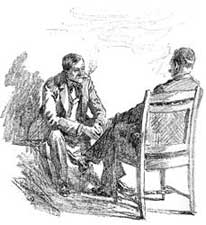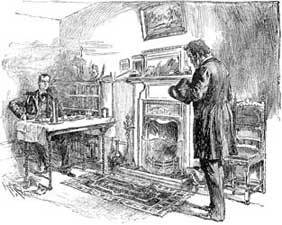






"Of air-guns."
"At the age of twenty-one he wrote a treatise upon the Binomial Theorem, which has had a European vogue…." Discovered by Euclid, and developed by Pascal and Newton, the binomial theorem expresses the expansion of a binomial (two variables added together) raised to a power. "But the man had hereditary tendencies of the most diabolical kind. A criminal strain ran in his blood, which, instead of being modified, was increased and rendered infinitely more dangerous by his extraordinary mental powers." Here, Conan Doyle refers to 19th-century scientist Cesare Lombroso's theory of the "born" or "atavistic" criminal. Moriarty is an exception among atavistic criminals who appear in literature, however; instead of having limited mental powers commensurate with his increased animal appetites, he possesses both criminal intent and extraordinary intelligence. Many readers have noticed that Moriarty is an evil twin of Holmes who turns his powers to crime instead of justice.
"...and the rope for all of them...." In other words, they will all be hanged. "I was sitting in my room thinking the matter over, when the door opened and Professor Moriarty stood before me." Moriarty only appears in two Holmes stories: "The Final Problem" and the last of the four Holmes novels, The Valley of Fear. (Mycroft Holmes, Sherlock's brother, only appears in three, although he is mentioned in several others.) Nevertheless, readers have remained fascinated with Sherlock Holmes's dark opposite. Writers of pastiches of Conan Doyle's work have taken great liberties with Moriarty's character. Was he indeed "the Napoleon of crime," or was he an innocent scapegoat for some dark obsession of Holmes's? Modern reworkings of the Conan Doyle canon, such as Nicholas Meyer's The Seven Percent Solution, often concentrate on Holmes's unique psychology, in which Moriarty figures prominently. |
||||||||||
Copyright ©
2006 Stanford University. All rights reserved. Stanford, CA 94305, (650)723-2300
l Terms
of Use

